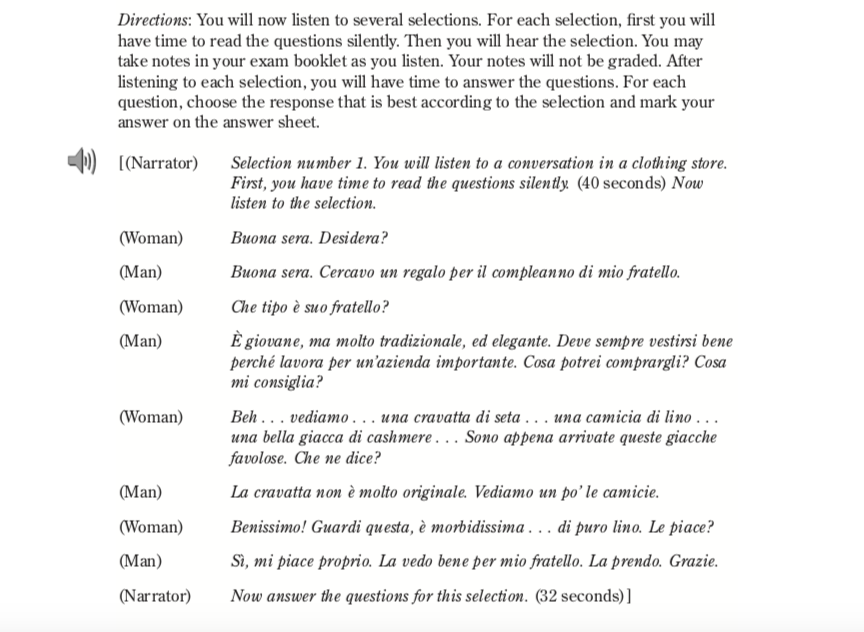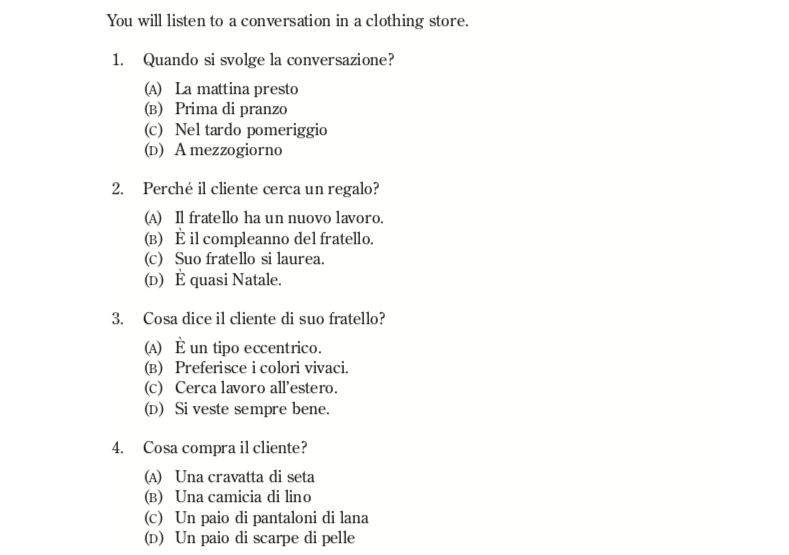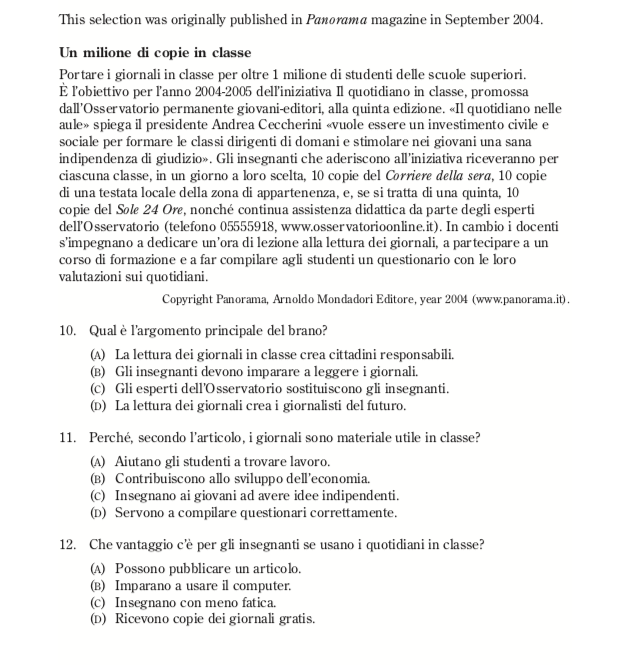AP Italian Multiple Choice Help (MCQ)
5 min read•november 13, 2020
Charly Castillo
Charly Castillo
AP Italian 🇮🇹
39 resourcesSee Units
AP Italian Multiple Choice Help (MCQ)
Knowing a test's format 📝 is important for any AP class, and the AP Italian Language & Culture exam is no exception to this. If you know how the ins and outs of the exam, like how long each section of the exam is and what the questions will look like, you'll be prepared for anything that the College Board will throw at you on testing day. And most importantly, you'll feel confident in how you did 😄.
In this post, we'll go over the first section of the AP Italian exam, the multiple-choice questions, and everything you need to know about them. Let's get into it!
What Should I Know About the MCQs?
Like on most other AP exams, you'll take the multiple-choice section first. Starting with the 2021 exam, this section will consist of 65 questions, and you will have 95 minutes (AKA 1 hour, 35 minutes ⏲️) to complete all of them. This means that you have a little less than 1.5 minutes to answer each question, which may sound like a crunch for time 😩 but is actually not so bad, considering how simple some of them are. Knowing exactly how this section works is so important (so be sure to take notes on all of this ⬇️ ⬆️), especially since it is worth 50% of your final AP score.
The multiple-choice section is further broken up into two subsections, regular multiple choice and multiple choice with audio. More on those below:
Section 1A: Multiple Choice
- This section of the MCQs tests your interpretive communication skills by having you answer 30 questions that are based on written materials like advertisements, chart, and more typical literary texts. You will have 40 minutes to complete this first part.
Section 1B: Multiple Choice with Audio
- This section is similar to the previous one, but also includes audio sources like conversations, presentations, and public service announcements. You will have 55 minutes to answer 35 of these questions, which is a little more time than what you got for Section 1A (cue the celebratory music 🎉).
What Is Covered in the MCQs?
All of the questions given to you on the multiple-choice section will be related to at least one of the class' units. Here's what they are:
- Unit 1: Families in Different Societies 👨👩👧👦 👨👦 👩👩👧
- Unit 2: The Influence of Language and Culture on Identity 🎼
- Unit 3: Influences of Beauty and Art 🎭
- Unit 4: How Science and Technology Affect Our Lives 🤖
- Unit 5: Factors That Impact the Quality of Life 🏚️
- Unit 6: Environmental, Political, and Societal Challenges 🌪️
What Are Some Example MCQs?

Image from the 2011 AP Italian Language and Culture CED. Example of a conversation you may hear on the exam

Image from the 2011 AP Italian Language and Culture CED. Corresponding questions for the conversation from above. Be sure to answer them as practice before looking at the explanations below!
The first question asks "Quando si svolge la conversazione?", which asks when the conversation that you ready above ⬆️ took place. Based on the woman's use of the phrase "buona sera", meaning good evening, we can assume that it took place sometime in the late afternoon, so (C) nel tardo pomeriggio is the answer.
Question 2 asks why the client is looking for a looking for a gift 🎁, and the answer is because it is his birthday or (B) è il compleanno del fratello.
When the client is talking about his brother, he says that he always dresses well, so (D) si veste sempre bene is the correct answer.
And now we've made it to the last question for this print example. This question is asking what the client ends up buying for his brother, and from reading, we know that he ends up purchasing (B) una camicia di lino 👔.

Image from the 2011 AP Italian Language and Culture CED. Another example of a written source and multiple choice questions
Now, we're moving on to a slightly longer and more difficult passage, but don't let that trip you up. Be sure to read the text above thoroughly and answer the questions to the best of your ability using your knowledge of the Italian language 🧠 and context clues. You should always check for context clues, as they can help you answer a question if you don't know a specific vocab word, or don't understand a certain part of the passage!
Question 10 asks something very direct, "Qual è l'argomento principale del brano?" or "What is the main topic of the passage?". After reading the excerpt above, you should be able to tell that (A) best describes it.
The answer to the next one is (C) insegnano ai giovani ad avere idee indipendenti because the excerpt is making the argument that using newspapers in class teaches young people to form opinions 🤔.
Lastly, Question 12 asks about an advantage of using newspapers in classes that is mentioned in the article. The only answer that would fit this question and is supported in the article would be (D) ricevono copie dei giornali gratis, or that they already receive free copies of them 🗞️.
Want audio practice? Visit this link to hear an example of a multiple choice audio source.
And that's it! Hopefully, this post taught you about the multiple-choice section of the AP Italian Language & Culture Exam and makes you feel more comfortable with the content tested in this part. Whether you feel like you have this section in the bag or need more help with it, be sure to practice lots of multiple-choice questions before exam day in May. Happy studying, AP Italian students 🇮🇹
Browse Study Guides By Unit
👨👩👧Unit 1 – Families in Italy
🗣Unit 2 – Language & Culture in Italy
🎨Unit 3 – Beauty & Art in Italy
🔬Unit 4 – Science & Technology in Italy
🏠Unit 5 – Quality of Life in Italy
💶Unit 6 – Challenges in Italy
✏️Frequently Asked Questions
📝Exam Skills: FRQ/MCQ

© 2023 Fiveable Inc. All rights reserved.